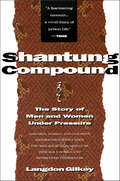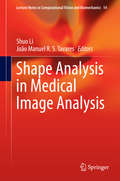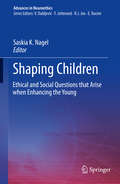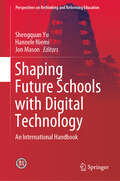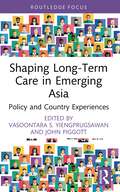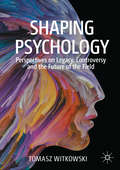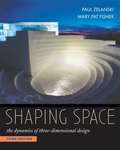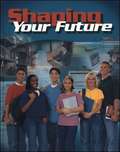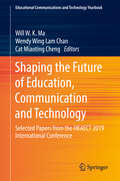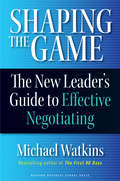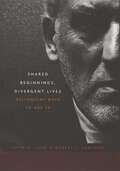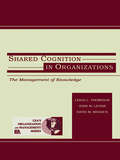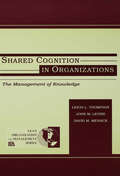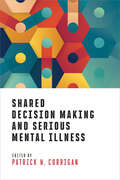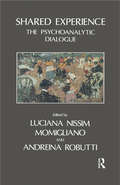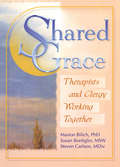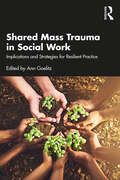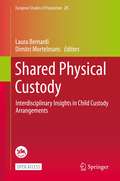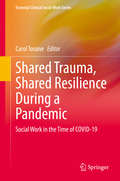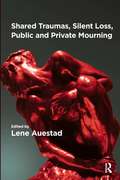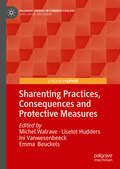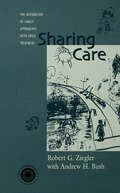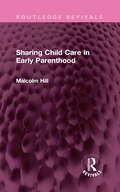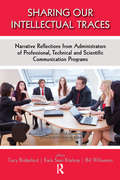- Table View
- List View
Shane Comes Home
by Rinker BuckOn March 21, 2003, while leading a rifle platoon into combat, Marine Lieutenant Shane Childers became the first combat fatality of the Iraq War. In this gripping, beautifully written personal history, award-winning writer Rinker Buck chronicles Shane's death and his life, exploring its meaning for his family, his fellow soldiers, and the country itself. It is the story of an intelligent, gifted soldier who embodied the soul of today's all-volunteer warrior class; of the town of Powell, Wyoming, which had taken Shane into its heart; and of the Marine detail sent to deliver the news to the Childers family and the extraordinary connection that formed between them.At once an inspiring account of commitment to the military and a moving story of family and devotion, Shane Comes Home rises above politics to capture the life of a remarkable young man who came to symbolize the heart of America during a difficult time.
Shantung Compound: The Story of Men and Women Under Pressure
by Langdon GilkeyThis vivid diary of life in a Japanese internment camp during World War II examines the moral challenges encountered in conditions of confinement and deprivation.
Shape Analysis in Medical Image Analysis
by Shuo Li João Manuel R. S. TavaresThis book contains thirteen contributions from invited experts of international recognition addressing important issues in shape analysis in medical image analysis, including techniques for image segmentation, registration, modelling and classification and applications in biology, as well as in cardiac, brain, spine, chest, lung and clinical practice. This volume treats topics such as for example, anatomic and functional shape representation and matching; shape-based medical image segmentation; shape registration; statistical shape analysis; shape deformation; shape-based abnormity detection; shape tracking and longitudinal shape analysis; machine learning for shape modeling and analysis; shape-based computer-aided-diagnosis; shape-based medical navigation; benchmark and validation of shape representation, analysis and modeling algorithms. This work will be of interest to researchers, students and manufacturers in the fields of artificial intelligence, bioengineering, biomechanics, computational mechanics, computational vision, computer sciences, human motion, mathematics, medical imaging, medicine, pattern recognition and physics.
Shaping Children: Ethical and Social Questions that Arise when Enhancing the Young (Advances in Neuroethics)
by Saskia K. NagelThe volume offers a unique collection of articles on pediatric neuroenhancement from an international and multidisciplinary perspective. In recent years, the topic of “neuroenhancement” has become increasingly relevant in academia and practice, as well as among the public. While autonomous adults are free to choose neuroenhancement, in children it presents its own ethical, social, legal, and developmental issues. A plethora of potential (neurotechnological) enhancement agents are on the market. While the manifold issues surrounding the topic have been extensively discussed, there is little work on the specific questions that arise in children and adolescents. This book addresses this gap in the literature: Next to conceptual and normative work on autonomy and self-control, the collection explores the implications for parenting and schooling, and provides input for a discussion of public attitudes. It is a valuable resource for the different academic communities confronted with questions of how to evaluate and approach enhancement in children and is of interest to neuroethicists, scholars in applied ethics and neurology, psychiatrists and psychologists as well as scientists developing enhancement interventions for children.
Shaping Future Schools with Digital Technology: An International Handbook (Perspectives on Rethinking and Reforming Education)
by Shengquan Yu Hannele Niemi Jon MasonThis book presents an overview of education technology and its use in schools, with a primary emphasis on best practices of technology enhanced learning; how new technologies such as mobile, augmented and wearable technologies affect instructional design strategies; and the content curriculum development process. Providing insights into the future of education and the upcoming pedagogies that will be applied in schools, it helps educators and other stakeholders make innovations for the new generations of learners in the 21st century.The use of emerging technologies such as mobile and ubiquitous technologies, context-aware technology, augment-reality, and virtual reality is contributing to making education adaptive and smarter. With the ever-changing technologies, how to equip teachers with these digital skills and transform their teaching style is also important to ensure that school education is more individualised and customised for students.Offering a global perspective with integrated practical cases, this timely book is of interest to educators, teachers, and education policymakers. And although most of the authors are from the academia, it provides non-experts with a novel view of what future schools will be like with the help of technology.
Shaping Long-Term Care in Emerging Asia: Policy and Country Experiences (Routledge Advances in Asia-Pacific Studies)
by Vasoontara Sbirakos YiengprugsawanCountries are facing increasing life expectancy and a shrinking family size and in effect, this may escalate demands for medical and supportive services. The role of families in providing informal care will remain important. However, the simultaneous decline in the supply of informal caregiving caused by changes in family structure and higher female labour-market participation necessitate the expansion of the public role in care provision. This book analyses the challenges of long-term care (LTC) policy development and implications from advanced LTC systems and a current trajectory in emerging economies in Asia. The book approaches the subject through comparative analysis on what works and what does not to provide insight into public policy options for sustainable LTC provision and financing mechanisms. How the countries adopt different approaches to health and social systems towards LTC development could provide important insight and perspectives into policy options in the region. This book aims at academics, policymakers and practitioners in health, social, and aged care services and could also be used as a teaching resource for undergraduate students in health and social sciences and postgraduate programs in public health, epidemiology, social demography, gerontology, and nursing. The book will be of interest to a wider audience not only on social and health consequences of population ageing but also health and social policy relating to older persons.
Shaping Psychology: Perspectives on Legacy, Controversy and the Future of the Field
by Tomasz WitkowskiShaping Psychology is a unique collection of in-depth conversations with a selection of the most influential psychologists working today, conducted at the end of a decade that shook psychological science. They provide insights into the controversies at the heart of contemporary psychology, revealing a clash of visions of what psychological science is all about and what its future holds. They are candid on the crisis in psychology and explore its causes, consequences and how to overcome it. They also discuss challenges in the field, their careers, and the experiences that shaped their worldview.Those interviewed include pioneers who have shaped psychology as we know it today and who represent a wide range of specializations, from research to mental health practice, mainstream psychology to critical psychology and neuroscience to the Open Science movement. Elizabeth F. Loftus, Stanford University, USAJerome Kagan, Harvard University, USAMichael I. Posner, University of Oregon, USAScott O. Lilienfeld, Emory University, USARobert J. Sternberg, Cornell University, USARobert Plomin, King’s College London, UK Susan J. Blackmore, University of Plymouth, UKJoseph E. LeDoux, New York University, USANoam Chomsky, Massachusetts Institute of Technology, USARoy F. Baumeister, University of Queensland, AustraliaErica Burman, University of Manchester, UKBrian A. Nosek, University of Virginia, USAVikram H. Patel, Harvard Medical School, USADaniel Kahneman, Princeton University, USACarol A. Tavris, independent academic, USA,
Shaping Space The Dynamics of Three-Dimensional Design 3rd Edition
by Mary Pat Fisher Paul ZelanskiThis book offers an engaging, in-depth exploration of the aesthetic and practical considerations of working three-dimensionally. It also includes new and expanded coverage of kinetic art, ephemeral and conceptual work, and works incorporating video and sound.
Shaping Your Future
by Connie R. Sasse Eddye Eubanks Linda R. GlossonPrepare your students for success in the years following graduation with this inspiring new text. Designed for high school independent living courses, this new text was written by Family and Consumer Sciences experts in practical problem-solving, relationship skills, and consumer education skills.
Shaping the Future of Education, Communication and Technology: Selected Papers from the HKAECT 2019 International Conference (Educational Communications and Technology Yearbook)
by Will W. K. Ma Wendy Wing Lam Chan Cat Miaoting ChengThis book gathers selected papers from the Hong Kong Association for Educational Communications and Technology 2019 International Conference on the theme of “Shaping the Future of Education, Communication and Technology.” It contributes to a scholarly discussion that looks beyond what future media and technology can offer for education, and reflects on best practices and lessons learned from applying new media and technology in a wide range of fields. Scholars from educational technology, communication, and higher education share their research work in various formats such as empirical research, best-practice case studies, literature reviews, etc. The topics of the papers are divided into four main areas, including curriculum, pedagogy and instructional design; teaching and learning experiences with technology; online learning and open education resources; and communication and media. The book’s unique quality is its combination of perspectives and research work on communication, education and technology. Thus, it will encourage an interdisciplinary discourse and exchange concerning communication, new media, and educational practices.
Shaping the Game
by Michael WatkinsMichael D. Watkins' best-selling book The First 90 Days has become the business bible for accelerating leadership transitions. Now, Watkins zeroes in on the most critical skill leaders must master to secure new roles and accelerate their transitions: negotiation. In Shaping the Game: The New Leader's Guide to Effective Negotiating, Watkins draws from extensive research and practical consulting work to reveal four fundamental objectives that should guide new leaders' actions in every negotiation they undertake: create the most possible value, capture that value for yourself and your company, carefully tend to key relationships, and preserve your reputation. Watkins lays out hands-on strategies for becoming a world-class negotiator, including how to match your negotiation strategy to the situation, influence the perspectives of key counterparts, shape negotiation outcomes in your favor, and create the learning discipline necessary to become a world-class negotiator. Navigating the myriad complex, high-stakes negotiating challenges that confront new leaders, this book provides all the tools readers need to make the right moves up the career ladder-and succeed in those roles once they get there.
Shared Beginnings, Divergent Lives: Delinquent Boys to Age 70
by John H. Laub Robert J. SampsonThis book analyzes newly collected data on crime and social development up to age 70 for 500 men who were remanded to reform school in the 1940s. Born in Boston in the late 1920s and early 1930s, these men were the subjects of the classic study Unraveling Juvenile Delinquency by Sheldon and Eleanor Glueck (1950). Updating their lives at the close of the twentieth century, and connecting their adult experiences to childhood, this book is arguably the longest longitudinal study of age, crime, and the life course to date. John Laub and Robert Sampson's long-term data, combined with in-depth interviews, defy the conventional wisdom that links individual traits such as poor verbal skills, limited self-control, and difficult temperament to long-term trajectories of offending. The authors reject the idea of categorizing offenders to reveal etiologies of offending--rather, they connect variability in behavior to social context. They find that men who desisted from crime were rooted in structural routines and had strong social ties to family and community. By uniting life-history narratives with rigorous data analysis, the authors shed new light on long-term trajectories of crime and current policies of crime control.
Shared Cognition in Organizations: The Management of Knowledge (Organization and Management Series)
by David M. Messick Leigh L. Thompson John M. LevineWritten for those interested in the topic of "shared knowledge" in organizations, this edited volume brings together a variety of themes and perspectives that emerge when multidisciplinary scholars examine this important subject. The papers were presented at a conference designed to bring together behavioral scientists who were interested in the creation, conversation, distribution, and protection of knowledge in organizations. The editors bring together a distinguished group of social psychologists who have made important contributions to social cognition and group processes. They cast a wide net in terms of the topics covered and challenged the authors to think about how their research applies to the management or mismanagement of knowledge in organizations. The volume is divided into three sections: knowledge systems, emotional-motivational systems, and communication and behavioral systems. A final conclusion chapter discusses and integrates the various contributions.
Shared Cognition in Organizations: The Management of Knowledge (Organization and Management Series)
by David M. Messick Leigh L. Thompson John M. LevineWritten for those interested in the topic of "shared knowledge" in organizations, this edited volume brings together a variety of themes and perspectives that emerge when multidisciplinary scholars examine this important subject. The papers were presented at a conference designed to bring together behavioral scientists who were interested in the creation, conversation, distribution, and protection of knowledge in organizations. The editors bring together a distinguished group of social psychologists who have made important contributions to social cognition and group processes. They cast a wide net in terms of the topics covered and challenged the authors to think about how their research applies to the management or mismanagement of knowledge in organizations. The volume is divided into three sections: knowledge systems, emotional-motivational systems, and communication and behavioral systems. A final conclusion chapter discusses and integrates the various contributions.
Shared Decision Making and Serious Mental Illness
by Patrick W. CorriganEmpower self-determination through inclusion, equity, and community collaboration with this invaluable resource on shared decision making. This book is a comprehensive guide to shared decision making (SDM), which is both a treatment philosophy and a well-developed clinical approach that clarifies responsibilities and tasks between patients with serious mental illness, providers, families, and other stakeholders, framing a person&’s pursuit of health and life goals in terms of partnership. Patrick Corrigan weaves together general concepts of self-determination with the details of actually doing SDM. The chapters outline basic SDM principles within social and psychological contexts, taking into consideration variances related to diversity, equity, inclusion, and accessibility and examining the unique intersections of the individual identity, with an emphasis on race and ethnicity, culture, age, and poverty. These principles are then put into action with concrete, step-by-step guidance on doing SDM, complete with worksheets and case examples.Shared Decision Making and Serious Mental Illness examines SDM's place in the evolution of a recovery-oriented care system from resistance and compliance to self-determination. It reviews principles and practices of community-based participatory research that are relevant to SDM, looking ahead to the future of SDM and serious mental illness.
Shared Experience: The Psychoanalytic Dialogue
by Luciana Nissim MomiglianoThis book presents a way to formulate, from several points of view, "Psychoanalysis as an encounter between two persons", and highlights the aspects of symmetry and affective exchange of this encounter where analysis is seen as a relationship between two minds. In this shared experience the study of the mind of the Analyst and of his method of work grows in importance as the source of benefits and misdirections which can be exchanged in the encounter with the patient. In this context, the patient has an active role as an attentive and sensitive observer of the Analyst, signaling errors and showing the road to be taken. This change in the concept of psychoanalysis has evolved through many years; from the Analyst acting to open the patient within himself, while at the same time struggling against his own resistance to change, to a vision of a "Couple at Work". Psychoanalysis is now a "shared experience", in which the listening and creating of internal space to the other, within the self, is the instrument and the journey.
Shared Grace: Therapists and Clergy Working Together
by Harold G Koenig Susan Bonfiglio Marion A Bilich Steven D CarlsonLearn how theology and psychology can work together to provide effective therapy!Shared Grace provides a framework within which mental health professionals and clergy can work together to provide people in need with appropriate psychological services and spiritual interventions. Breaking down the walls between psychology and religion, this guide offers you proven and tried methods and models from the authors’collaborative work. Comprehensive and intelligent, this vital book will help therapists incorporate a spiritual dimension to their sessions and give patients successful and effective services.Shared Grace is also a book about the healing power of love. It is the very personal, intense account of the authors&’ work to help a woman who suffered from dissociative identity disorder heal from the effects of her childhood abuse. Through this poignant story, you&’ll find that adding a spiritual dimension into psychotherapy brings increased richness and depth to the therapeutic process. Step-by-step practical suggestions for collaboration between therapist and clergy are included. Issues brought to light in Shared Grace include: transforming damaged and dysfunctional images of God the establishment of support systems within the religious community the use of guided imagery the creation of healthy rituals and ceremoniesShared Grace will help therapists and clergy alike and enable each to obtain the support, education, and training to make interdisciplinary collaboration successful.
Shared Mass Trauma in Social Work: Implications and Strategies for Resilient Practice
by Ann GoelitzThis edited volume looks at the phenomenon of shared trauma and how it affects social workers and their clients alike. Bringing together established voices from the field of social work, Shared Mass Trauma in Social Work presents ideas of how to provide resilient care and practice while social workers and their clients are both experiencing the same mass trauma. Social workers are often on the front line when community trauma occurs, and the boundary between their experiences and those of clients can become blurred. In this timely resource, Ann Goelitz and the contributors aim to share both their findings and evidence-based tools to help professionals look after themselves and their clients in times of turmoil. Beginning by setting a conceptual framework for shared trauma and reviewing related research, the contributors discuss the concept as it relates to events such as the coronavirus pandemic, climate change and natural disasters, police brutality and racism, and war and terrorism. Filled with case studies that bring the text to life, chapters then move to the modalities of psychotherapy, group work, and community organizing, before concluding with reflections and lessons learnt for future practice. The glossary of terms, sample syllabus, and practical exercises to support training social workers are a bonus for educators. Shared Mass Trauma in Social Work incorporates specific implications, trauma-informed care, social work principles, and practical tips to support training and established clinicians working in unprecedented circumstances.
Shared Physical Custody: Interdisciplinary Insights in Child Custody Arrangements (European Studies of Population #25)
by Laura Bernardi Dimitri MortelmansThis open access book provides an overview of the ever-growing phenomenon of children in shared physical custody thereby providing legal, psychological, family sociological and demographical insights. It describes how, despite the long evolution of broken families, only the last decade has seen a radical shift in custody arrangements for children in divorced families and the gender revolution in parenting which is taking place. The chapters have a national or cross-national perspective and address topics like prevalence and types of shared physical custody, legal frames regulating custody arrangements, stability and changes in arrangements across the life course of children, socio‐economic, psychological, social well-being of various family members involved in different custody arrangements. With the book being an interdisciplinary collaboration, it is interesting read for social scientists in demography, sociology, psychology, law and policy makers with an interest family studies and custody arrangements.
Shared Trauma, Shared Resilience During a Pandemic: Social Work in the Time of COVID-19 (Essential Clinical Social Work Series)
by Carol TosoneThis contributed volume reflects on the collective wisdom and ongoing efforts of the social work profession that has been in the forefront of the global pandemic of COVID-19. The contributors are seasoned social work academics, practitioners, administrators, and researchers. Working on the frontlines with patients and families, these social workers have garnered experiences and insights, and also have developed innovative ways to mitigate the impact of the coronavirus on the psychosocial well-being of their clients and themselves. The 36 reflections, experiences, and insights in this curated collection address the behavioral, mental health, socioeconomic, and other repercussions of the coronavirus pandemic that have impacted their client base, most of whom are vulnerable populations:Repurposed, Reassigned, Redeployed Safety Planning with Survivors of Domestic Violence: How COVID-19 Shifts the FocusCOVID-19 and Moral Distress/Moral Anguish Therapeutic Support for Healthcare Workers in Acute Care: Our VoiceShared Trauma and Harm Reduction in the Time of COVID-19Wholeheartedness in the Treatment of Shared Trauma: Special Considerations During the COVID-19 PandemicThe Role of Ecosocial Work During the COVID-19 Pandemic: The Natural WorldBlack Lives, Mass Incarceration, and the Perpetuity of Trauma in the Era of COVID-19: The Road to Abolition Social WorkTeaching Social Work Practice in the Shared Trauma of a Global Pandemic The COVID-19 Self-Care Survival Guide: A Framework for Clinicians to Categorize and Utilize Self-Care Strategies and PracticesShared Trauma, Shared Resilience During a Pandemic: Social Work in the Time of COVID-19 is an early and essential work on the impact of the pandemic on the social work field with useful practice wisdom for a broad audience. It can be assigned in masters-level social work practice and elective courses on trauma, as well as inform both neophyte and experienced practitioners. It also would appeal to the general public interested in the work of social workers during a pandemic.
Shared Traumas, Silent Loss, Public and Private Mourning: Shared Traumas, Silent Loss, Public and Private Mourning
by Lene AuestadThis book questions the junctions of the private and the public when it comes to trauma, loss, and the work of mourning - notions which, it is argued, challenge our very ideas of the individual and the shared. It asks, to paraphrase Adorno, 'What do we mean by "working through the past"?, 'How is a shared work of mourning to be understood?', and 'With what legitimacy do we consider a particular social or cultural practice to be "mourning"?' Rather than aiming to present a diagnosis of the political present, this volume instead takes one step back to pose the question of what mourning might mean and what its social dimension consists in. Contributors reflect on the trauma of the Holocaust, the after-effects of the Vietnam War in the US, the Lebanese war-torn experience, victims of the Pacific War in Taiwan, and the Chilean dictatorship.
Sharenting Practices, Consequences and Protective Measures (Palgrave Studies in Cyberpsychology)
by Michel Walrave Liselot Hudders Ini Vanwesenbeeck Emma BeuckelsThis book provides an interdisciplinary analysis of the sharenting phenomena, while discussing the various stakeholders involved, e.g., the portrayed children and adolescents, (grand)parents and other family members. Sharenting, i.e. parents’ disclosure of personal information related to their children on social media, is increasingly the subject of public debate. Moreover, some parents participate in influencer sharenting, where they generate revenue by featuring their children in professionalised and commercialised social media content, often in collaboration with brands. However, while sharing personal information of children has become common practice, concerns arise regarding its risks. Consequently, sharenting has been studied in several disciplines, including communication studies, psychology, marketing, criminology, law, sociology, and health sciences. This interdisciplinary approach, adopted by this book, generates several suggestions for future research, alongside practical implications for parents and policy makers.
Sharing Care: The Integration of Family Approaches with Child Treatment
by Robert Ziegler Andrew BushFirst Published in 1999. Routledge is an imprint of Taylor & Francis, an informa company.
Sharing Child Care in Early Parenthood (Routledge Revivals)
by Malcolm HillOriginally published in 1987, Malcolm Hill examines the different ways in which parents share responsibility for looking after their pre-school children with other people, whether members of their social networks, formal groups or paid carers. He also looks at the reasons parents give for choosing and changing their particular arrangements. In this way he provides insights into a range of ideas which ordinary members of the public have about children’s needs; the rights and responsibilities of mothers and fathers; and how children think and feel. Marked differences are described in the social relationships of families and in notions about who is acceptable as a substitute carer for children, in what circumstances and for what purpose. Several of these contrasts are linked to attitudes and life-conditions which are affected by social class. The book identifies possible consequences for individual children’s social adaptability resulting from these patterns of care. It suggests that people working with the under-fives could profit from adapting their activities and services to children’s previous experiences of shared care and families’ differing expectations about groups for children.
Sharing Our Intellectual Traces: Narrative Reflections from Administrators of Professional, Technical, and Scientific Programs (Baywood's Technical Communications)
by Bill Williamson Tracy Bridgeford Karla Saari KitalongAdministrators of academic professional and technical communication (PTSC) programs have long relied upon lore--stories of what works--to understand and communicate about the work of program administration. Stories are interesting, telling, engaging, and necessary. But a discipline focused primarily on stories, especially the ephemeral stories narrated at conferences and deliberated at department meetings, usually suffice primarily to solve immediate problems and address day-to-day concerns and activities. This edited collection captures some of those stories and layers them with theoretical perspectives and reflection, to enhance their usefulness to the PTSC program administration community at large. Like the ephemeral stories PTSC program administrators are accustomed to, the stories told in this volume are set within specific institutional contexts that reflect specific institutional challenges. They emphasize the intellectual traces--the debts the authors owe to those who have informed and transformed their administrative work. In so doing, this collection creates another conversation--albeit a robust, diverse, and theoretically informed one--around which program leaders might define or redefine their roles and re-envision their administrative work as the rich, complex, intellectual engagement that we find it to be. This volume asks authors to move beyond a notion of administration as an activity based solely in institutional details and processes. In so doing, they emphasize theory as they share their reflections on core administrative processes and significant moments in the histories of their associated programs, thereby affording opportunities for critical examination in conjunction with practical advice.

